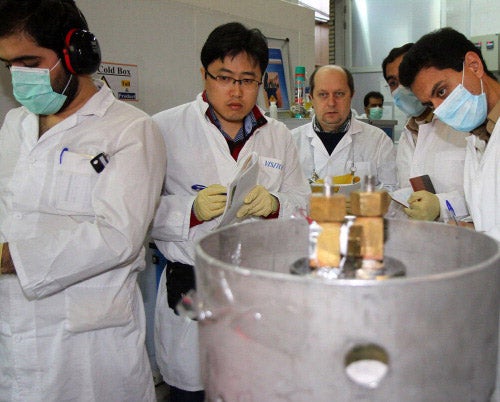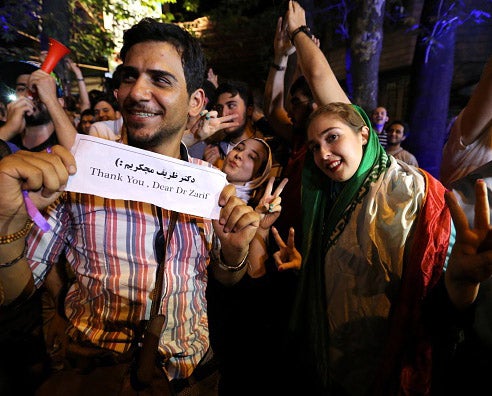IAEA rejects claims Iran will be allowed to self-inspect nuclear testing site
UN and Iran reportedly agreed deal to let Iranian inspectors conduct their own tests on the Parchin military base

Your support helps us to tell the story
From reproductive rights to climate change to Big Tech, The Independent is on the ground when the story is developing. Whether it's investigating the financials of Elon Musk's pro-Trump PAC or producing our latest documentary, 'The A Word', which shines a light on the American women fighting for reproductive rights, we know how important it is to parse out the facts from the messaging.
At such a critical moment in US history, we need reporters on the ground. Your donation allows us to keep sending journalists to speak to both sides of the story.
The Independent is trusted by Americans across the entire political spectrum. And unlike many other quality news outlets, we choose not to lock Americans out of our reporting and analysis with paywalls. We believe quality journalism should be available to everyone, paid for by those who can afford it.
Your support makes all the difference.The global nuclear watchdog has rejected claims Iran will be allowed to use its own inspectors to investigate a site suspected of being used to develop atomic weapons.
According to documents seen by the Associated Press, the UN has made a secret agreement with Tehran to uphold the conditions of the nuclear deal with the US and five other world powers in July.
AP reported that the deal would see Iranian inspectors send their findings about the Parchin military base, which is suspected conducting nuclear tests, to the UN’s International Atomic Energy Agency (IAEA).
The UN has insisted the arrangement complies with the conditions set out in the deal - conditions that must be met in order for Western powers to lift the economic sanctions against Iran.

The agreement was greeted by jubilation on the streets of Tehran, where years of trade sanctions have severely damaged the Iranian economy but led to a 10,000-strong, according to organisers, protest in New York from Americans worried about the threat to Israel.
The claims have led to further outrage from already sceptical Republican lawmakers in the US, who have complained that it is impossible to trust the Iranian regime.
Speaker of the House of Representatives, John Boehner said: “President Obama boasts his deal includes 'unprecedented verification.' He claims it's not built on trust. But the administration's briefings on these side deals have been totally insufficient - and it still isn't clear whether anyone at the White House has seen the final documents.”
House Foreign Affairs Committee Chairman Ed Royce said: "International inspections should be done by international inspectors. Period."
The agreement reached between Iran and the IAEA was completely separate to the nuclear deal agreed with the Western powers, although they were briefed on its progress.
But a spokesman for the White House National Security Council, Ned Price, said the Obama administration was "confident in the agency's technical plans for investigating the possible military dimensions of Iran's former program. ... The IAEA has separately developed the most robust inspection regime ever peacefully negotiated."
And the claims were subsequently questioned by arms control expert Jeffrey Lewis, who told Vox: "The story was the Iranians would take the samples under some kind of IAEA monitoring.
"The details of that monitoring were not provided, so it's hard to say how weird that is. Some IAEA officials say that it's not unusual to let a country physically take the samples if there's an IAEA inspector present."
"The oldest Washington game is being played in Vienna. And that is leaking what appears to be a prejudicial and one-sided account of a confidential document to a friendly reporter, and using that to advance a particular policy agenda."
Israeli news website Haaretz noted that much of the detail initially included in the AP story was omitted from later versions, including the claim that Iranian scientists - rather than UN officials - would be inspecting air and soil samples at Parchin.
The site quoted IAEA Director General Yukiya Amano as saying "Such statements misrepresent the way in which we will undertake this important verification work."
Additional reporting by AP
Join our commenting forum
Join thought-provoking conversations, follow other Independent readers and see their replies
Comments